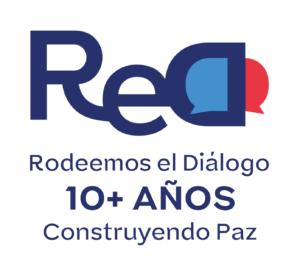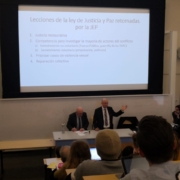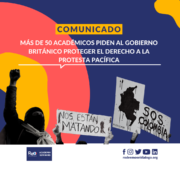Education Conflict and Peace in Colombia: an international seminar and workshop
Education Conflict and Peace in Colombia: an international seminar and workshop
29-30 June 2015 – Faculty of Education, University of Cambridge
Organized by:
● Cambridge Peace and Education Research Group (CPERG)
● Rodeemos el Dialogo (ReD) UK/Colombia
● UCL Institute of Education Colombian Students
Overview:
This two-day international seminar and workshop explores education as a critical but overlooked aspect of the Colombian peace process. Experts and participants will engage with the question, “How can the education sector contribute to sustainable and long-lasting peace in post-agreement Colombia?” Policymakers, researchers, educators and activists will have the opportunity to reflect critically together on the relationship between education policies, practices, and conflict drivers in Colombia and comparable contexts. They will also engage collaboratively in the identification of conflict-sensitive strategies for aligning education reform and the processes of conflict transformation and sustainable peacebuilding in Colombia.
Programme:
Day 1 comprises an expert panel discussion on interactions between education, armed conflict, and peace. Given the nature of the Colombian conflict, special focus will be on comparative case studies from Latin America which share the characteristics of asymmetrical armed conflict involving guerrilla and government forces, terrorism, narcotics production and trafficking, economic inequality, mass displacement, and Demobilization, Demilitarization and Rehabilitation (DDR) programming. The focus will not be on conflicts of religion and ethnicity which have less relevance to the Colombian case.
Day 2 will offer a workshop for participants with special interest in and knowledge of the Colombian context and education sector. The session will be divided into three parts: 1) introduction to the INEE toolkit for conflict-sensitive educational planning and provision; 2) a participatory conflict-mapping exercise of the Colombian education sector; 3) a participatory policy development and advocacy planning exercise for peacebuilding through education in Colombia.
Event Details and Registration:
See website: http://ecpccambridge.wix.com/conference Email: ecpc.cambridge@gmail.com
Background:
Since the 1960s, Colombia has been affected by armed conflict between the Colombian government, paramilitary groups, crime syndicates and left-wing guerrillas such as the Revolutionary Armed Forces of Colombia (FARC), and the National Liberation Army (ELN). It is the longest internal conflict in Latin America. According to a study by Colombia’s National Centre for Historical Memory, 220,000 people have died in the conflict between 1958 and 2013, most of them civilians (177,307 civilians and 40,787 fighters) and more than five million civilians were forced from their homes between 1985 – 2012, generating the world’s second largest population of internally displaced persons (IDPs). Since 2002, peace negotiations have led to the demobilization of thousands of guerrilla combatants. Since 2012, the main parties involved have been moving closer to a political solution to the conflict, and the government has begun a process of providing assistance and reparations to victims. However, the details of the political settlement have yet to be finalized, and it is a fact that Colombian society remains divided by the conflict, both politically, economically, and socially. Education figures only marginally in the agenda currently guiding the Colombian peace negotiation process—an omission that is deeply disturbing. While Colombian educational reform efforts are currently underway, they are likewise completely disconnected from the peace negotiation process taking place in Cuba. Historically, Colombian education policy and curricula have not been framed through a conflict sensitive approach. Generally speaking Colombia’s violent dynamics have been either ignored or exacerbated in the classroom. Through both omission and commission, Colombia’s approach to education has contributed significantly to the ongoing conflict. An opportunity now exists to shape a positive role for education in the Colombian peace process.
Confirmed speakers:
Senator Claudia Lopez, Colombian Senator for the Green Alliance:
➢ Analysis of structural challenges of the Colombian education sector and proposed educational reforms in contribution to peace.
Julian De Zubiria, Founder of the Movement for Dialogic Pedagogy in Colombia, Consultant for UNDP and the Colombian Ministry of Education:
➢ Current state of the Colombian Education and proposed changes in contribution to peace: a pedagogical perspective
Dr. Andrei Suarez-Gomez, Research Associate Oxford and Sussex, Lecturer at Los Andes University:
➢ Introduction to the Colombian armed conflict and peace process
Dr. Tejendra Pherali, Senior Lecturer in Education and Int’l Development, UCL-Institute of Education:
➢ Influence of political-economic agendas on education: the case of Nepal
Professor Julia Paulson, Programme Leader, Department of Education, Bath Spa University:
➢ Relationship between truth commissions, historical memory and the education: the case of Peru
Dr. Jeremy Cunningham, Researcher, Conflict and Education Research Group, University of Oxford:
➢ Relationship between education and community cohesion: the case of Uganda Professor Alicia Cabezudo, Escuela de Ciencias de la Educación, Universidad Nacional de Rosario, Vice President, International Peace Bureau – IPB Geneva (TBC)
➢ Peace pedagogies and teacher training
Sponsors:
● Education Equality and Development (EED) Research Group, University of Cambridge
● Centre for Research on Equitable Access and Learning (REAL), University of Cambridge
● Centre for Latin American Studies (CLAS), University of Cambridge
● Colombian Society, London School of Economics
● St. Ethelburga’s Centre for Reconciliation and Peace
● Embassy of Colombia
● Avianca Airlines
Details and Registration:
See website: http://ecpccambridge.wix.com/conference Email: ecpc.cambridge@gmail.com


